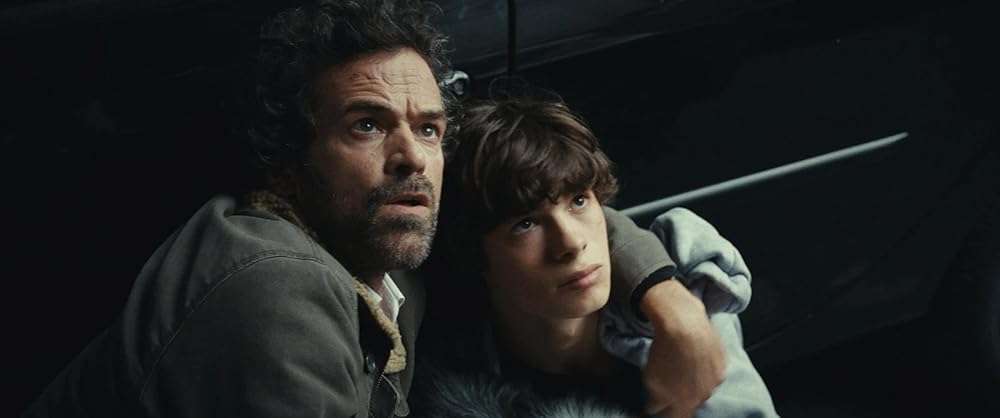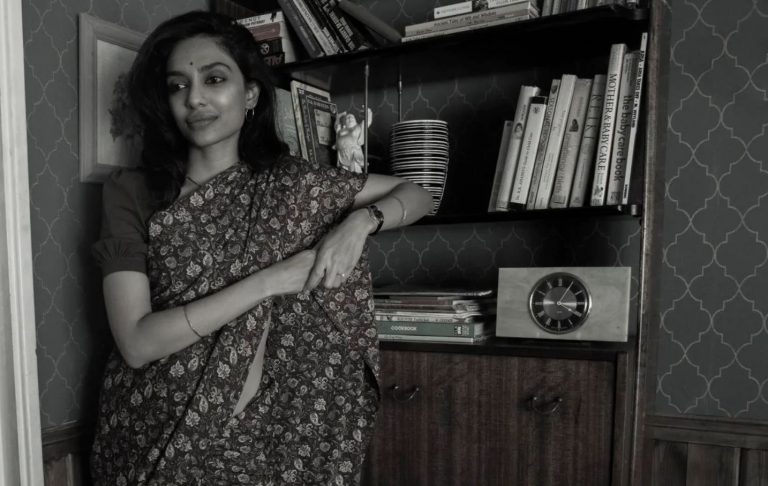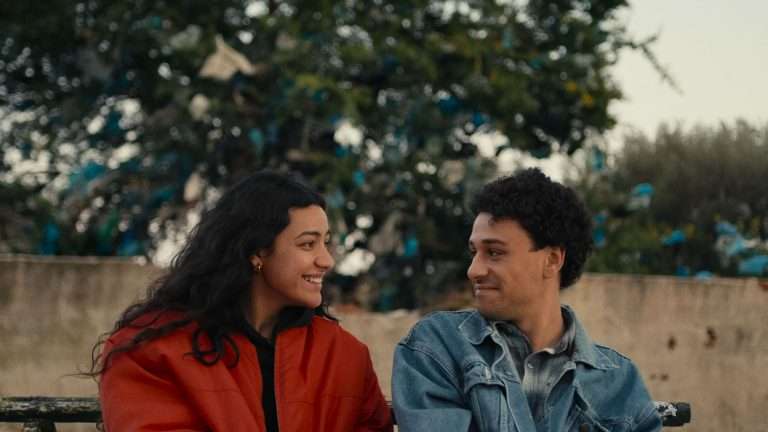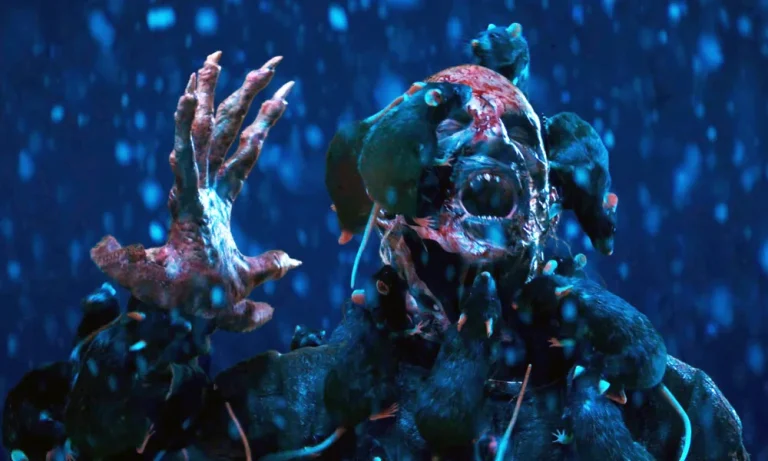What would happen if there were an outbreak of a mutation that caused several people around the world to transform into a sort of animal-human hybrid species? This is the very eye-catching premise of The Animal Kingdom. Our two main characters, Francois and his 16-year-old son Emile, have a personal connection to this situation since Francois’s wife is also slowly succumbing to this mutation. Being a sucker for high-concept films, I was itching to know more about the mutations – their origin, why did it start, was it manufactured, and so on.
But I understand why director Thomas Cailley refrained from doing that so as to avoid overburdening the screenplay (Cailley co-wrote it with Pauline Munier) with too much expository jargon. Thus, while the film does introduce us to a whole new world, it still withholds some worldbuilding nitty-gritty so that it can jump directly into the story. With Francoise’s wife’s treatment not yielding results, she and others like her are shifted to a new facility somewhere in countryside France, which also prompts Francoise and Emile to start a new life there.
While the facility is mentioned as a treatment center, clues interspersed throughout the film suggest that it might also be a place for the government to conduct experiments on this new species in tandem with the military. Soon, a car carrying the mutants has an accident, and all the mutants, including Francoise’s wife, escape into the forest. Francois and Emile then begin searching for her, kickstarting the plot. One of the stand-out features of the film is its remarkable creature effects. Using realistic prosthetic work with a subtle garnishing of computer-generated effects it makes each and every mutant, even the ones we see in passing, look believable.
Let’s take the example of Fix, the bird-human hybrid who befriends Emile. His design would require precise fine-tuning, given that we see him up close for a reasonable amount of time. The film wholeheartedly takes up this challenge and delivers it to the tee. His changing facial structure, the injuries he sustains, and the movement of his wings – all look highly realistic. What this also does is help us connect to his character and, in turn, invest in his and Emile’s friendship, which solidifies even further when Emile starts helping him learn how to fly.
Fix and Nina, a girl in Emile’s high school, are the only people Emile actually connects with; Nina because he likes her and Fix because Emile too starts showing symptoms of the infection, specifically that of a wolf. His slowly changing body structure, including sharp fingernails, excess body hair, and a stronger spine, is also brilliantly accomplished using the aforementioned creature effects. This is an exciting but unsurprising turn in the writing since his father, Francoise, has mixed feelings towards the mutants. He knows they can be uncontrollable, like when Fix gets territorial and attacks Emile when they meet for the first time.
But he also cannot downright hate them as his wife is one too. Francoise and Emile, however, are surrounded by townsfolk who cannot stand these mutants. This explains why Emile has a hard time connecting with his xenophobic high schoolers and why he is terrified of telling his father about him turning into a mutant as well. Right at the mid-point of the film, Francoise learns the truth about Emile. Until this point, he has been relentlessly searching for his wife with the help of a local police officer, Julia, but to no avail.

In fact, he does meet his wife face-to-face only to realize that she has completely transformed into a hybrid species, and it’s time for him to let her go. And so, amidst a whirlwind of emotions, his goal shifts from looking for his wife to protecting his son. This also opens up the possibility of a romantic track between Francoise and Julia, which the film has clearly hinted at. Of course, with the way the authorities dehumanize the hybrid species, the themes of animal cruelty and man’s excessive dominance over nature are laid out. However, unlike the themes of racism, they are just there for the sake of it.
There is hardly any depth to the authorities as they are presented as shallowly as possible – loud men with guns. This becomes very evident in the film’s final act, where the townsfolk find out the truth about Emile and begin chasing him. In the process, they kill Fix, who was trying to help Emile escape, which turns out to be the film’s rare emotional moment thanks to the well-developed meaningful friendship shared by the two.
At this point, things start heating up as they should do in the climax of any film – Emile, now driven by his father, is being chased down by several police cars in the forest. The stage is set for an explosive showdown. Then Francoise stops the car, tells his son he loves him, and opens the car door for him to escape into the forest – a place where he truly belongs. Once Emile disappears into the forest, the film cuts to black. Immediately, one would think, “That’s a nice cliffhanger. I really wanna see what happens in the next episode,” only to realize that this is no TV show.
Although it has all the ingredients of being one, it brings me to the significant issue of the film. There are several tracks that the film knowingly opens and then forgets to conclude. We were promised the showdown between Emile and the authorities, but it never happened. Take the romantic track between Julia and Francoise; the film takes ages to flesh out their growing relationship, and then it’s discarded by the end. Finally, take the worldbuilding, which rightfully withholds the details of the disease but then goes all-out in crafting minute details of the countryside town, giving enough screen time to the high school, the local bar, literally even capturing an annual local festival.
It’s as if the film starts developing all these aspects in hopes of either resolving or continuing them in some distant future. The filmmaker is perhaps thinking long-term here. The problem is they only have two hours, which isn’t enough for their ambitious narrative. What we end up with is a TV show stuck in a feature film. Given that a lackluster ending can ruin even a great film, The Animal Kingdom falls short of expectations despite having an excellent concept at its center.

![Annihilation [2018] – An Ultimately Disappointing Take on a Bewitching Sci-Fi Premise](https://79468c92.delivery.rocketcdn.me/wp-content/uploads/2018/03/natalie-portman-stars-in-annihilation-768x383.png)
![We Had it Coming [2021] Review – A bleak rape-revenge drama that presents a one-dimensional world](https://79468c92.delivery.rocketcdn.me/wp-content/uploads/2021/09/AlexiaFast_NatalieKrill-768x512.jpg)

![Rewriting History with the Ink of Film: Once Upon a Time in Hollywood [2019]](https://79468c92.delivery.rocketcdn.me/wp-content/uploads/2019/08/once-upon-a-time-in-hollywood-768x427.jpeg)

